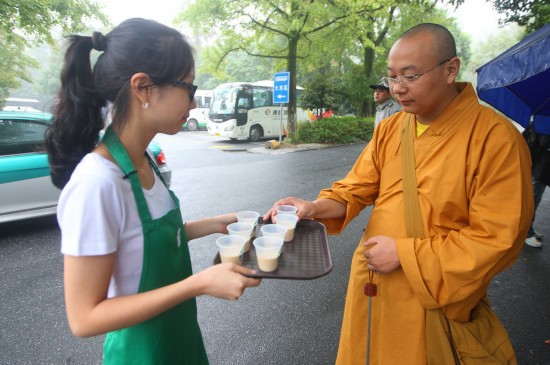Controversy over Starbucks' tying knot with Lingyin Temple
 0 Comment(s)
0 Comment(s) Print
Print E-mail People's Daily, September 28, 2012
E-mail People's Daily, September 28, 2012
The world's largest coffee chain Starbucks' newly opened outlet close to one of Buddhism's most famous temples - Hangzhou's Lingyin Temple has sparked a heated debate about a clash of cultures in China.
|
|
|
[Xinhua] |
Pros: Why can't Starbucks lie beside Lingyin Temple?
It is important to know where exactly the new store is located. If it is located inside the Lingyin Temple, it is of course controversial. However, if the new coffeehouse is located just in the commercial zone of the Lingyin Temple Scenic Area, arguing over it will be really pointless.
Cultural attractions and stores are interdependent in modern tourism. Cultural attractions attract visitors, while stores bring revenue to local tourism. There is no such thing as a place of interest without nearby stores. If many people oppose setting up a Starbucks outlet in the scenic area due to concerns it may bring the stink of money, the first thing they should oppose is temples charging admission fees. By extension, they should also oppose the sale of souvenirs or donation of money at any temple. If they cannot do that, they should admit the reasonableness of the existence of these stores in scenic areas.
Supporters, however, said they welcomed the outlet as a place for tourists to enjoy a drink after visiting the temple.
Talk of an "invasion" was misplaced, they said, as the outlet was not inside the temple but on a nearby commercial street where a KFC restaurant and a shopping mall had been open for more than six months.
Cons: Keeping historical sites away from mercenary stinks
An important reason that makes Starbucks become the target of public criticism is that "it is a cup of coffee in a simple perspective, but a cultural symbol in a more complex sense."
Many historical sites in China have always faced the problem of looking for a balance between cultural traditions and business development. Let us take a look at the practices in other countries: the "Forbidden City" in South Korea, Gyeongbokgung Palace, is protected by local government regulations which forbid food or drink store's operation in the palace area with the only exception of the beverage vending machine at the gate; while Japan preserves the historical sites in a more conservative way, that the cultural heritage may be "downgraded" or its name removed from the publicly recognized list of "national treasure" and "important cultural properties" in case of unauthorized introduction of modern equipment and industry.
Critics said, must the ancient Chinese culture give way to the Western and commercial atmosphere? Starbucks should try open branch in London's Big Ben.
"So today we can allow having a Western coffee shop near the Buddhism temple, then why can't we have a massage house or a sex toy shop nearby tomorrow?" was another microblog comment.







Go to Forum >>0 Comment(s)